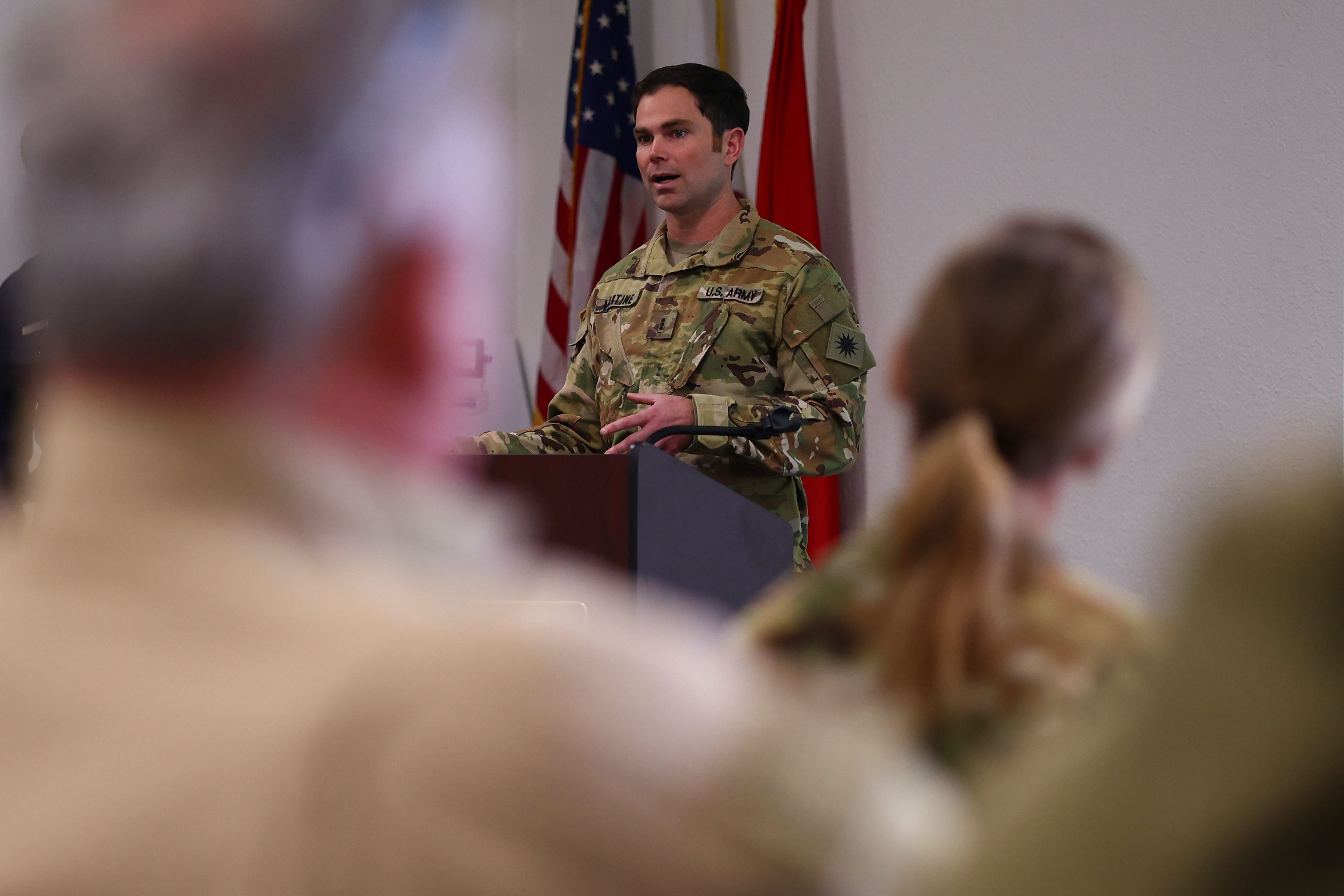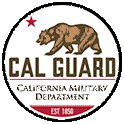Many Languages, One Voice
by Lt. Col. Jan Bender
California National Guard Public Affairs
Aug. 9, 2023
SACRAMENTO, Calif. – The California Army National Guard’s Intelligence Directorate, CA-G2, hosted a Command Language Program Manager’s workshop near Lake Tahoe from June 13-15 for intelligence and language leaders from across the state and country to share resources, exchange best practices, discuss ongoing policy changes and synergize for the way ahead.
The workshop included presenters from the Department of the U.S. Army Intelligence Directorate, DA-G2, the Army Intelligence and Security Command language team, 500th Military Intelligence Brigade, Fort Huachuca’s Intelligence Center of Excellence, California State University Long Beach Language Training Center, U.S. Army Southern Command, the National Guard Bureau’s language team, the Defense Language Institute, as well as the California Army National Guard’s Human Resources, Logistics and Intelligence Directorates.
CLPM teams from across California, Pennsylvania, Illinois, Texas, Florida, Michigan, and the New York Army National Guards were also present, with others from Washington, Hawaii and Colorado dialed in from afar.
Why Here, Why Now
“We’ve learned at the highest levels within the [Department of Defense] how painful it is not to have qualified linguists when contingencies arise,” explained Col. Devin Lamb, the director of Joint Intelligence, J2, for the Cal Guard. “So, we have dedicated funding that Army leaders have set aside for the coordination of workshops like this because we recognize how they stimulate cohesion, collaboration and resource sharing within this community.”
Many in attendance appreciated the quorum gathered and California’s leadership and vision within the community.
“The [Cal Guard] has one of the greatest concentrations of military linguists in the country… second only to Utah’s Guard,” explained Chief Warrant Officer 2 Chris Walstra, NGB’s Army Language Program manager, who oversees CLPM activities across all 54 states and territories. “Over 10 percent of the overall Army National Guard’s authorized linguist positions are within this state. They have built an excellent program here… they’re active and engaged, making a real difference for their Soldiers. I regularly encourage other states to mirror their efforts and experience the same return on investment.”
“An event like this is really important. So often as a community, we’re a bit fragmented and everyone is in their own foxhole… and not necessarily focused on the broader linguist community as a whole,” said Lamb, a Japanese linguist himself. “Here, we’re able to step back and acknowledge from a more strategic level, the challenges we’re facing and talk through it. We’ve got people here from across various states and key players from the national level and we’re able to identify chronic problems that many of us are experiencing… and we’ve got the right people in the room here to address it and in the end be better for it.”
What We Don’t Use… We Lose
The majority of qualified linguists within the Army’s intelligence or special forces community initiate or further refine their pre-existing multi-lingual skills by attending the DLI for anywhere from 36 to 64 weeks of intensive foreign language training. Yet, as immersive and effective as this world-class training experience has proven to be, upon graduation the Soldier’s most challenging chapter has just begun.
“DLI does a phenomenal job of training linguists… but once they’re pushed out to the National Guard force, it’s on us at the unit level to ensure we’re creating opportunities for them to sustain and improve this high-value skillset,” Walstra emphasized.
Hence the criticality of CLPMs across the National Guard to coordinate the regular testing and training of the linguist force at the brigade, battalion and company level to maintain and improve their proficiency with this perishable skillset year-over-year.
“This is a commander-driven program. We know from looking at trends across the country that success starts with well-trained CLPMs at the unit level,” Walstra clarified. “DLI hosts CLPM trainings around the world throughout the year and we’ve got dedicated funding to get your people there.”
Once a qualified CLPM is trained and in place, they become a conduit for a whole world of opportunities to keep their linguists’ edges sharp.
“Every Soldier that is in either a language-dependent or language-capable slot is entitled every year to what we call a significant language training event, or SLTE,” said Walstra. “We do our best to walk each state through where those are and how to get their people to them.”
SLTEs can take on many forms. They can be specific courses held on university campuses across the US, or around the world, or qualified immersion training can be achieved by attaching linguists to work in support of real-world training missions on the ground in regions relevant to their target language.
Maj. James Ailes, the Director of Intelligence for the Pennsylvania National Guard who is in the midst of energizing language initiatives for his state, had numerous takeaways from the workshop.
“I knew that language immersion is the best way to maintain efficiency and build proficiency …and [overseas] SLTEs are definitely the way to go for that,” said Ailes. “But I never even considered [overseas] SLTEs as much of a possibility, because of perceived funding constraints… but after hearing Chief Walstra clarify that many of them were more affordable than most stateside options and that stable funding exists for them… I’ll be taking a hard re-look at them for our team.”
Setting the Standard
Staff Sgt. Chris Levi has served as the California Army National Guard’s state CLPM under the CA-G2 for over two years and was the lead for organizing the workshop. In that time, he’s driven hard on three priorities for the state.
“First, we work to maintain the linguist we’ve got… by keeping them paid, trained and ready. Next, we’re working with our recruiters to help them understand the type of talent we’re looking for and the opportunities available as a linguist,” said Levi. “Finally, we’re working on capturing and tracking metrics for our core cadre of heritage speakers in the right systems to increase our capability to answer the call for unique mission sets when they arise.”
Staff Sgt. Levi is widely known for his resourcefulness and his collaborative approach to making a mission and is always willing to share the successes he finds.
“Networking has been huge… and developing mentors in and outside of traditional channels within both the Guard and Active-Duty communities to problem solve and find resources, has paid a lot of dividends for us as a state,” said Levi.
One of the tangible impacts he and his assistant Spc. Steven Scruggs have set in motion will be the creation and or modernization of five language labs at locations across California to accommodate the dispersed concentrations of Cal Guard linguist. These are expected to be equipped with computers, printers and projectors, and will come online in phases over the next six months to facilitate language testing and training for linguists statewide.
“[Staff Sgt. Levi] has really energized some great initiatives for our state. It's critical for our senior leaders to recognize that [our linguists] possess a high-value skillset… and that we cannot create trained and capable linguists overnight,” said Lamb. “We must regularly challenge and engage them… and give them the time and resources to hone their craft. We have to view it as a long-term investment… with unquestionable strategic returns, that we realize in full when we are called on for contingencies at home and abroad.”
One Team, One Fight…
As the workshop wrapped up, there was a real sense of unity with those who had gathered.
“The entire workshop has been fantastic… I’d like to commend the Cal Guard leadership for having the vision to reach out to other states and the broader community. Not just focusing on improving California. Having the mindset, that if we all do well, then the community itself does well. That open conduit for sharing knowledge and resources is invaluable and much appreciated,” said Ailes with a smile. “[Staff Sgt. Levi] is the God Father of CLPMs. I’ve learned so much from him and the others in the short time we’ve been here. I’m going to take all this back to my division and do a deep dive into what is possible with our linguist community.”
Those attending from the upper echelons of the linguist community echoed the value as well. Mr. Kyle Coker, a retired Marine linguist, and program analyst for the DA-G2’s Foreign Language Program briefed those gathered and appreciated the unique opportunity to engage with the community he supports on key issues.
“In-person opportunities like this are invaluable for getting live and interactive feedback from the field on how policies coming down from the top are impacting our linguist community,” said Coker. “The differences of how they affect the Guard versus active-duty formations is important. I’ve got a lot of notes to relay to our team… and now, the personal contacts to reach back out to for problem solving in the future. These things take time and it’s important to get us all on the same page so we can move forward together.”
Staff Sgt. Levi and his team felt a sense of accomplishment as they signed off with those gathered and talked about the challenges and rewards that lay ahead.
“We pride ourselves in being out front within the linguist community, pivoting fast and accurately when there are new policies to implement in the field, as well as rallying with our fellow states to share resources and best practices,” Levi said reassuringly.
“The most satisfying part of my job is when people think something can’t be done… and then we’re able to make it happen for them. The satisfaction of unlocking a pathway to a school for a Soldier, or for certain training for a whole unit. That’s how we take care of the force. I love that part of my job.”



